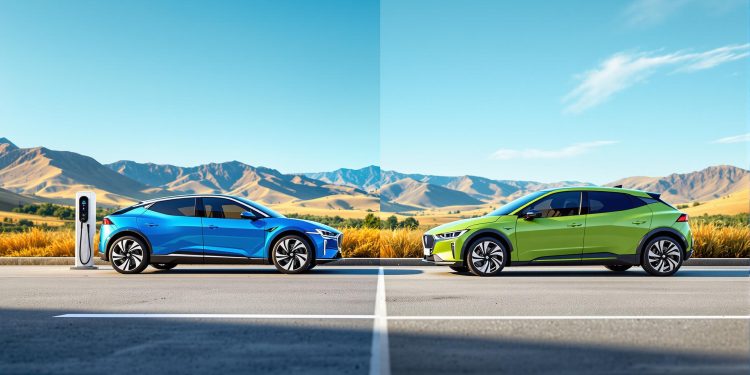Electric vehicles (EVs) generally cost less to "fuel" per mile compared to hybrids, thanks to cheaper electricity rates. However, hybrids offer flexibility by using both gasoline and electricity, making them better for long trips or areas with unreliable charging infrastructure. Here’s a quick breakdown:
- Electric Vehicles (EVs): Lower per-mile costs, rely entirely on electricity, but charging can be affected by power outages.
- Hybrid Vehicles: Use both gas and electricity, offering higher range and reliability, but higher fuel costs overall.
Quick Comparison
| Feature | Electric Vehicles (EVs) | Hybrid Vehicles |
|---|---|---|
| Fuel Dependency | Electricity only | Gasoline + Electricity |
| Cost Per Mile | Lower | Higher |
| Range | Limited by battery | Very high |
| Charging | External only | External + Self-Charging |
| Power Outage Impact | High | Low |
For South African drivers, EVs are cheaper to run but can be affected by load shedding, while hybrids are more versatile for varied driving needs. Choose based on your driving habits, charging options, and long-term costs.
Electric and Hybrid Basics
Understanding how electric and hybrid systems work is key because their designs directly impact fuel expenses and energy usage. Let’s break down how these systems differ.
Electric Vehicle Systems
Electric vehicles (EVs) rely entirely on electricity stored in a battery pack to power an electric motor. This design removes the need for traditional fuel components like gas tanks, fuel lines, or exhaust systems. Charging is done by plugging into an external power source, either at home or at public charging stations.
Hybrid Vehicle Systems
Hybrid vehicles use a combination of an internal combustion engine and an electric motor powered by a battery pack. This setup allows for flexibility in how power is delivered and fuel is used. There are two main types of hybrid systems:
- Standard Hybrids: These have a smaller battery pack that charges itself through braking and engine activity. They don’t need to be plugged in and automatically switch between the engine and electric motor based on driving needs.
- Plug-in Hybrids: These come with a larger battery pack and can be charged externally, offering a longer electric-only range. The gasoline engine kicks in when the battery runs low, providing a backup.
This combination is well-suited to various driving conditions, as the system chooses the most efficient power source based on speed, terrain, and battery levels.
| Feature | Standard Hybrid | Plug-in Hybrid | Pure Electric |
|---|---|---|---|
| Power Sources | Gasoline + Small Battery | Gasoline + Large Battery | Battery Only |
| Charging Method | Self-Charging | External + Self-Charging | External Only |
| Fuel Dependency | High | Low | None |
| Range Flexibility | High | Very High | Limited by Charge |
Fuel Cost Analysis Method
This section breaks down fuel costs for electric and hybrid vehicles through detailed calculations.
Cost Variables
Fuel costs for electric and hybrid vehicles depend on several key factors:
Electricity Rates
- Differences between peak and off-peak pricing
- Impact of load shedding on charging schedules
- Costs of charging at home versus public charging stations
Fuel-Related Costs
- Current gasoline prices
- Energy consumption rates for both vehicle types
| Cost Factor | Electric Vehicle | Hybrid Vehicle |
|---|---|---|
| Primary Energy | Electricity Only | Electricity + Gasoline |
| Charging Location | Home/Public Stations | Home + Gas Stations |
| Rate Variability | Peak/Off-peak Rates | Fuel Market Prices |
| External Factors | Load Shedding Impact | Fuel Availability |
These factors form the foundation for calculating fuel costs.
Cost Calculations
To calculate per-kilometer costs:
- Electric Vehicles (EVs): Multiply energy consumption (kWh per km) by the electricity rate, then adjust for efficiency losses.
- Hybrid Vehicles: Combine fuel costs ([fuel consumption × fuel price]) and electricity costs ([kWh per km × electricity rate]), then divide by the distance.
Annual costs are estimated using average driving distances, patterns, and seasonal energy variability. Tracking fuel and energy use under different driving conditions helps refine these calculations.
sbb-itb-09752ea
Direct Cost Comparison
Per-Kilometer Costs
Electric vehicles tend to cost less per kilometer compared to hybrids. This is largely because they rely on cheaper home electricity for charging. Hybrids, on the other hand, combine electricity with traditional fuel, which adds to their running costs. These comparisons are based on average electricity and fuel rates, along with typical energy consumption for each vehicle type.
Yearly Fuel Spending
For drivers covering about 20,000 km annually, electric vehicles can lead to noticeable fuel savings. However, the actual savings depend on driving habits and local energy prices. These yearly estimates provide a foundation for comparing the overall costs between electric and hybrid vehicles.
Cost Data Comparison
When looking at operational expenses, electric vehicles generally come out ahead with lower monthly energy costs. However, hybrids have the advantage of maintaining more consistent performance during power outages or periods of unstable electricity supply. Factors like load shedding can impact charging reliability for electric vehicles, so it’s important to consider these local challenges when evaluating the long-term benefits of each option.
Total Ownership Costs
Purchase Costs
In South Africa, the upfront cost of electric and hybrid vehicles plays a major role in decision-making. Electric vehicles usually have a higher initial price due to the expense of their battery systems. However, the growing availability of pre-owned options is making these eco-friendly cars more accessible for buyers on a budget.
Upkeep Expenses
Maintenance needs vary widely between electric and hybrid vehicles. Electric cars tend to have lower maintenance requirements because they have fewer moving parts and use regenerative braking systems. On the other hand, hybrids still require traditional engine services like oil changes and general engine upkeep. One major cost to keep in mind for both types is the eventual replacement of the battery. These ongoing expenses directly impact the long-term value of the vehicle.
Future Value
Depreciation is another key factor to consider when calculating ownership costs. A vehicle’s resale value is influenced by factors such as age, mileage, condition, and market demand. For both electric and hybrid models, proper maintenance can help retain a decent portion of their value. However, the condition of the battery is especially important when it comes to resale potential.
Summary and Advice
Main Findings
Fuel costs differ significantly for South African drivers depending on the type of vehicle. Electric vehicles (EVs) tend to have lower fuel costs thanks to affordable electricity. However, frequent load shedding can increase expenses, as alternative charging methods may be needed.
Hybrid vehicles, which use a mix of fuel sources, are well-suited for long trips and regions without reliable charging infrastructure. They provide a practical balance for diverse driving needs.
These points can help guide buyers toward a more informed decision.
Buyer Guidelines
When deciding between electric and hybrid options, keep these factors in mind to make the most cost-effective choice:
- Charging Options: Check the availability and stability of charging facilities in your area, especially if power outages are common.
- Driving Habits: For short, regular commutes, EVs often provide the most savings. If your driving involves varied distances or long trips, hybrids might be a better fit.
- Long-Term Costs: Look beyond the purchase price. Consider ongoing energy or fuel costs, maintenance, battery replacement, and resale value.
For South African buyers, the increasing availability of pre-owned electric and hybrid vehicles offers a chance to enter the eco-friendly market at a reduced upfront cost. If you’re considering a used vehicle, focus on models with a well-documented maintenance history and have the battery professionally inspected to ensure it’s in good condition.
Related Blog Posts
- Fuel-Saving Tips for Long South African Road Trips
- EV Buyers in South Africa: Emissions and Behavior
- Best Fuel-Efficient Cars for Commuting in South Africa
- EV Charging Costs in South Africa: Breakdown





